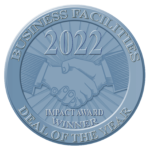The Development Corporation of Abilene Partners in Expansion of Three Major Projects, Combined Investment in Abilene Equals an Estimated $76.3 Million.
“We are proud to announce these three major partnerships and expansions directly following our success of bringing Great Lakes Cheese (GLC) to Abilene,” said Misty Mayo, President and Chief Executive Officer of the DCOA. “These projects represent the resilience and growth of the Abilene community, and we look forward to future developments with all of them,” continued Mayo.
“Project Tiger” was the designated name for the partnership with Primal Pet Group and the City Council’s approval of the $3.16 million incentive package enables the DCOA to enter into an agreement with Primal Pet for the expansion of its manufacturing facility in Five Points Business Park. Primal Pet Group’s expansion project is expected to create and retain over 250 jobs in Abilene.
“It continues to be an honor partnering with the Abilene community to expand Primal Pet Group’s operations by almost 60,000 square feet. This $30 million investment is critical to the Primal Pack’s fast paced growth strategy and mission to provide more dogs and cats wholesome, healthy, minimally processed foods,” said Travis Moore, Chief Operations Officer of Primal Pet Group.
Primal Pet Group expects to invest $31.6 million in the community, meaning for every $1.00 the DCOA invests through its incentive package, Primal Pets will invest $45.02 in Abilene through initial capital investment and direct spend over the next 10 years.
“Project Future Hope” was the designated name for the partnership with NEXT Lab and the City Council’s approval of the $2.93 million incentive package enables the DCOA to enter into an agreement with NEXT Lab to expand its research and development facility at the former Taylor Elementary School site. NEXT Lab’s expansion plans will retain 28 jobs while creating an additional 37 jobs, including 13 projected student positions.
“These projects are a tremendous win for Abilene,” said Mayor Anthony Williams. “Our community will not only benefit from stronger healthcare, research and development, and manufacturing facilities, but there are now additional well-paying, sustainable jobs available for the citizens of Abilene.”
ACU expects to invest $29.3 million in the community through NEXT Lab, meaning for every $1.00 the DCOA invests in the company through its incentive package, $23.14 is invested back into Abilene through initial capital investment and direct spend over the next 10 years.
“The support of our Abilene community and the DCOA is critical to our success, and we’re thankful for this partnership,” said Dr. Rusty Towell, Director of NEXT Lab. “Through this groundbreaking research venture, Abilene and ACU are at the forefront of developing advanced nuclear technology to address global energy needs,” Towell concluded.
“Project Double T” was the designated name for the partnership with Hendrick Health and the City Council’s approval of the $1.54 million incentive package enables the DCOA to enter into an agreement with Hendrick Health to expand its back office and warehousing facility in the Mall of Abilene. Hendrick Health’s expansion project is expected to retain 317 employees while creating an additional 74 jobs within the Abilene community.
“As always, we are focused on the long-term benefits these type of projects will have on our community and the strong return on investments demonstrate just how successfully the DCOA and local companies continue to work together to benefit the Abilene community,” said Jack Rich, DCOA Board Chair.
Hendrick Health expects to invest $15.4 million in the community, meaning for every $1.00 the DCOA invests in the company through its incentive package, Hendrick Health invests $28.66 back into Abilene through initial capital investment and direct spend over the next 10 years.
“This new service center is another way Hendrick is expanding access to our services and extending our mission while reducing inefficiency and fragmentation,” said Brad Holland, President and CEO of Hendrick Health. “By relocating existing administrative services currently housed in and around our campuses, we can reallocate valuable space to expand clinical services for patients,” Holland concluded.



